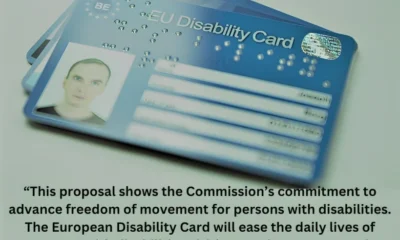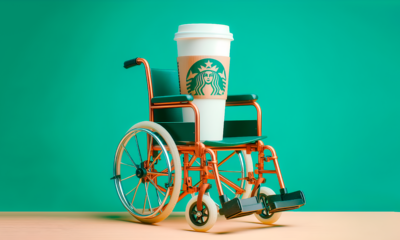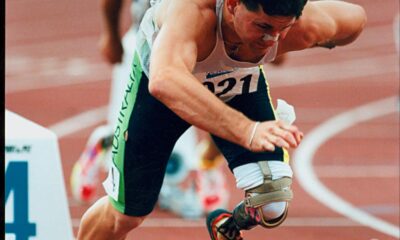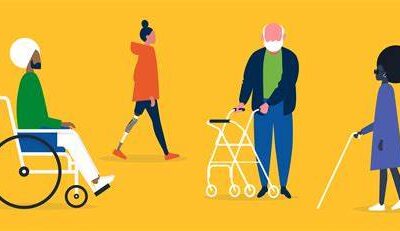Featured
The Metaverse: How Inclusive Is It?
‘Metaverse’ was one of 2022’s favourite buzzwords. But, how inclusive is our favourite digital world for the disabled community?
Seemingly, the metaverse is everywhere you go. And, it’s totally unavoidable, however hard you try. And, as both brands and individuals continue to engage with it in nuanced ways, this mind-blowing immersive virtual world is showing no signs of slowing down. The number of users is expected to reach 1.4 billion in 2023 and 1.7 billion in 2024. But, 60% of digital consumers feel there is a lack of inclusivity in metaverse worlds, despite 61% agreeing the metaverse could be a positive experience for disabled people, showing the platform’s potential to excite and entice our community.
So, what does the metaverse have to offer the disabled community? Brunel University London has highlighted how its many avenues could be revolutionary for us. From improving your social life through shared experiences to its educational and work opportunities, this platform has some real benefits. It can even help with condition diagnostics and treatment planning.
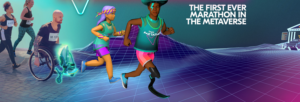
© Degree
Beyond this, how is the metaverse doing in terms of representation and inclusivity? In a Meta blog post dedicated to the subject, the company outlines its plans to ensure the disabled community continue to feel welcome. For example, they have collaborated with United Spinal Association’s tech access program to understand disabled individuals’ needs in more depth. This research informed their launch of cochlear implants, wheelchairs and over-the-ear hearing aids to be used on people’s avatars within the Web3 world. Customisable avatars can be created via the Meta Avatars Store, which offers users multiple ways to show up as their authentic selves.
Elsewhere, brands are creating tools for the disabled community to engage fully in new experiences within the metaverse. Take Playground Games, the developers behind racing game Forza Horizon 5, as a prime example. They have created features, including American and British Sign Language support in cinematics and a colour blindness mode to ensure their game is experienced at its best for all. Also, deodorant brand Sure, known as Degree in the US, even hosted an in-metaverse marathon where players were able to take part in wheelchairs, prosthetics and blades. During the race, people were encouraged to share their inspiring stories about their unique difficulties when it comes to movement, in turn spreading awareness of disability and its challenges.
While there is always room for both improvement and innovation when it comes to the disabled community feeling fully comfortable and welcome in a new space, these ideas show the virtual world’s true potential.
Featured
EU’s New Disability Cards Ease Cross-Border Travel for Individuals with Disabilities
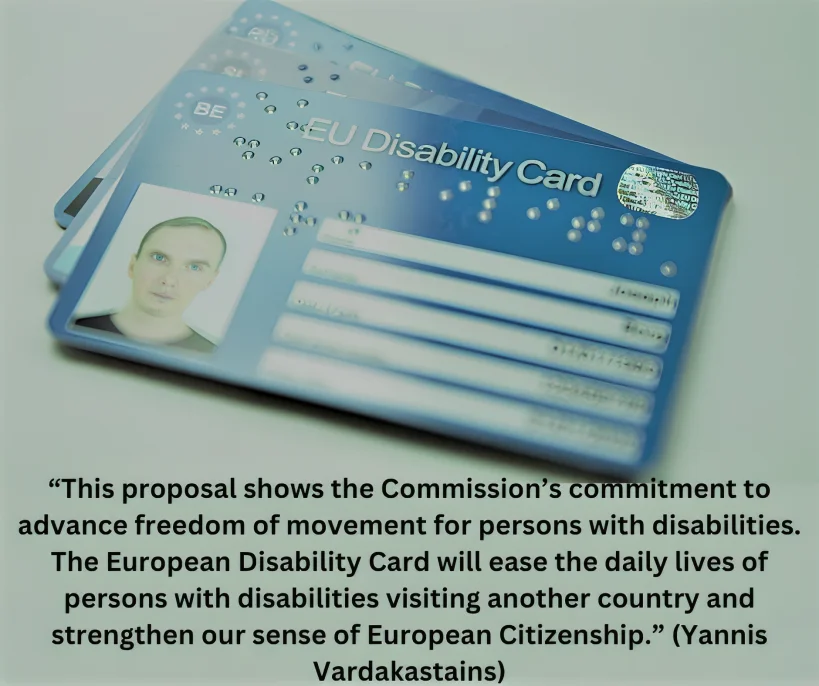
The EU disability card is a recent effort from the European Union, which has a long history of upholding inclusion and human rights. This card, which is intended to empower people with disabilities, is poised to transform cross-border travel for people with disabilities and guarantee that everyone can enjoy the richness and beauty of Europe.
Comprehending The European Union Disability Card
The EU disability card, a ground-breaking instrument that provides a plethora of advantages to its holders, is at the center of the EU’s inclusion initiatives. This card gives you priority access to transportation, tourist attractions, and cultural institutions throughout all member states, making it the key to seamless travel experiences.
The EU Disability Card’s Advantages
The advantages of having an EU Disability card are numerous, ranging from useful features like lowered admission costs to necessities like help and support. It’s a daring step toward equality, making sure that a disability doesn’t take away from the excitement of discovery.
Qualifications And Application Procedure
The comprehensive qualifying requirements for the EU disability card are made to accommodate a wide range of disabilities. The EU’s commitment to accessibility is shown in the application process for the disability card, which is a simple process that allows all qualified individuals to enjoy travel freedoms.
Improving Cross-Border Mobility For Person With Disabilities
The creation of the EU disability card is a shining example of advancement for disabled people traveling inside the EU. It removes administrative and physical obstacles to create a travel experience that is easy and dignified.
Accessibility And Disability Rights In The EU
The EU disability card is a bold assertion of disability rights in the EU, not just a tool for easier travel. It transforms the long-advocated EU principles of the United Nations Convention on the Rights of Persons with Disabilities into concrete travel benefits.
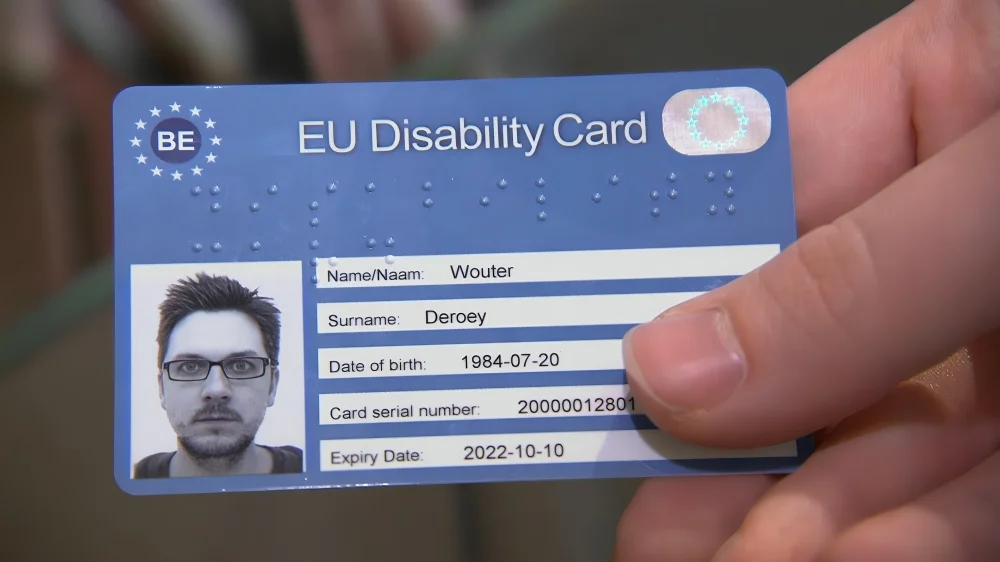
The Effect On Accessible Tourism In The EU
The EU disability card has significant knock-on effects for accessible travel inside the EU. It serves as a catalyst for change, forcing the travel and tourist sector to reconsider and improve its accessibility features. This not only improves the vacation experience for those with disabilities but also points to a change in the tourist industry toward greater inclusivity.
A Heritage Of Liberty And Inclusivity
The EU’s new disability card is a symbol of inclusivity and the strength of group will, as well as a significant advancement in accessibility. It is a major win for disability rights in the EU and a sign of the solidarity of the European people in recognizing that freedom and mobility are rights that everyone has, not just some.
This card has the power to change lives in addition to making cross-border travel easier for people with disabilities. It’s a promise of a more inclusive future, a bridge between cultures, and a gateway to new experiences. Around the world, the EU is spreading a message of opportunity and hope as it leads the way in accessible tourism.
The perks of travel are not the only things that the EU disability card has to offer. It is a force for transformation, prompting businesses, authorities, and communities to reconsider their stance on diversity. The card pushes us to stretch our imaginations and see a society in which everyone, regardless of ability, can easily and dignifiedly discover the wealth of our diverse continent.
As we commemorate the introduction of the EU disability card, we also anticipate the tales of trips undertaken, obstacles overcome, and opportunities gained. This card is more than just a piece of plastic; it represents a Europe that appreciates each and every one of its citizens and welcomes them all.
The smiles on people’s faces, the experiences it makes possible, and the conversations it sparks about the value of accessibility in all facets of life will ultimately be the real indicators of the success of the EU disability card. It’s a step toward a future in which being “disabled” doesn’t imply limitations but rather a new perspective on the wonders that surround us.
The EU disability card serves as a beacon of progress and a timely reminder that, when we band together for the greater good, we can make the world a more prosperous, compassionate, and inclusive place for all.
Obiosah Rowland
Featured
Alem Mumuni: Pedaling Beyond Limits to Empower Ghana
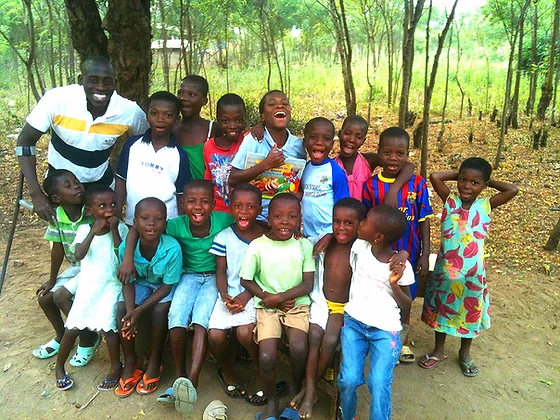
From his early struggles as a polio survivor in Ghana to becoming the nation’s first Paralympic cyclist, Alem Mumuni’s journey is not just one of personal triumph, but a relentless pursuit of empowerment for himself and countless others.
Born into a reality where disability was often met with limitations, Alem’s life took a dramatic turn at the age of two when he contracted polio. This left him without full use of his right leg. Yet, Alem’s spirit remained unbroken. Fuelled by the unwavering support of his family, particularly his persistent cousin, he defied expectations. Not only did he learn to walk again, but he also became the first child in his family to step through the schoolhouse doors.
Despite societal perceptions that often viewed disability as a hindrance, Alem embraced every opportunity. He actively participated in sports alongside his able-bodied peers, discovering a particular fondness for cycling. This seemingly ordinary activity became a source of liberation for Alem, offering him a sense of mobility and freedom that transcended his physical limitations. With unwavering dedication, he honed his skills on the bicycle, eventually setting his sights on the competitive arena of para-cycling.
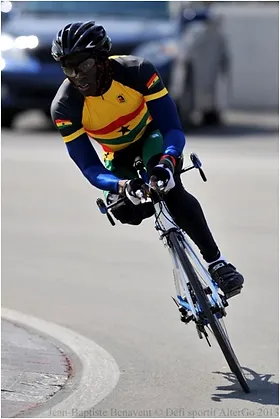
Alem’s unwavering determination culminated in a historic moment for Ghana in 2012. He qualified as the nation’s first Paralympic cyclist, earning a coveted spot at the London Paralympic Games. While illness hampered his performance at the Games, his mere presence was a groundbreaking feat. Alem’s participation on the global stage shattered stereotypes, proving that individuals with disabilities possessed immense capabilities waiting to be unleashed.
Returning to Ghana a flagbearer for change, Alem channeled his Paralympic experience into a force for good. He established the Alem Foundation, a platform dedicated to uplifting underprivileged children and families. Partnering with passionate individuals who shared his vision, Alem launched various initiatives focused on creating sustainable solutions for marginalized communities. These initiatives ranged from sponsoring children’s education to ensuring access to clean water and vital healthcare, empowering entire families to break free from the cycle of poverty.
Alem’s impact extends far beyond individual empowerment. He recognized the systemic barriers faced by people with disabilities in Ghana and became a fervent advocate for inclusivity and equal opportunities. Leveraging his platform and the connections he forged through sport, Alem championed policies and initiatives that promoted a more inclusive society. He envisioned a Ghana where individuals with disabilities were not just seen, but valued, empowered, and given the platform to thrive.
Even as Alem continues to build a lasting legacy, his unwavering commitment extends beyond personal accolades. He remains an inspiration for those facing adversity, a living testament to the power of perseverance. Alem’s story embodies the true meaning of resilience, proving that disability is not a limitation, but rather a catalyst for positive change and boundless potential.
In Alem Mumuni, we find a beacon of hope, a testament to the transformative power of sport, and a powerful reminder that the human spirit can overcome any obstacle. As he continues to pedal towards a brighter future, Alem leaves behind a legacy that illuminates pathways of possibility for generations to come, inspiring others to push beyond perceived limitations and embrace the boundless potential within themselves.
By: Yahuza Bawage
If you enjoyed reading this article, be sure to check out this other fascinating piece!
For the latest updates, Download P+us app available on Google App Store
Culture
Initiatives Empowering people with Albinism in Africa
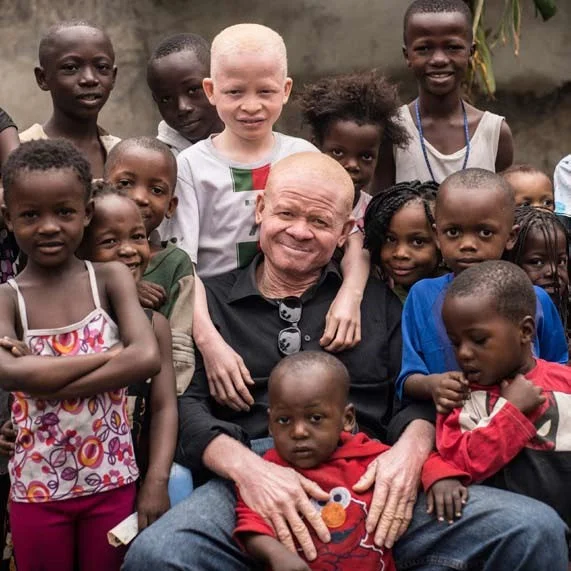
In the heart of Tanzania, a group faces a harsh reality: discrimination and violence due to albinism. Standing Voice, a British and Tanzanian NGO, is on a mission to change that. Founded by filmmaker Harry Freeland, the organization works tirelessly to improve the lives of people with albinism through healthcare, education, advocacy, and community development.
Freeland’s journey with albinism began with a documentary, “In the Shadow of the Sun.” Witnessing the struggles of people with albinism firsthand, particularly the high rate of skin cancer deaths due to lack of access to treatment, sparked his passion to make a difference.
Standing Voice’s approach is centered on empowerment. They train local healthcare professionals to provide crucial dermatological care, including skin cancer screening and prevention. The organization also distributes specially formulated sunscreen, Kilimanjaro Sunscreen (KiliSun), to protect against the harsh African sun.
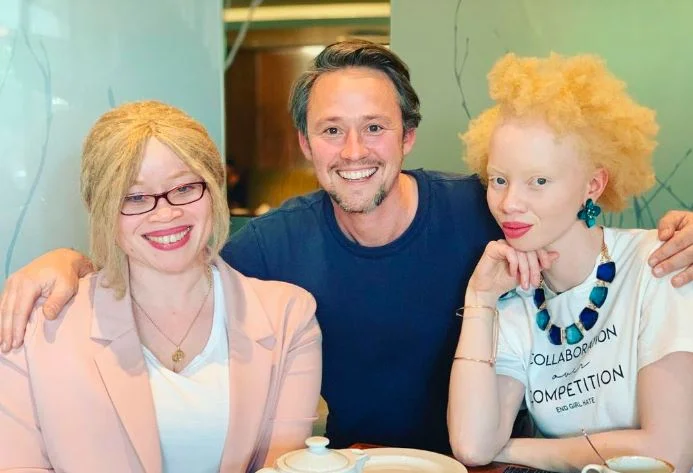
@harry_freeland Instagram
Education is another key area of focus. Many children with albinism struggle in school due to poor vision. Standing Voice’s Vision Programme provides eye exams, distributes corrective lenses, and educates teachers on how to support students with albinism. Breaking the cycle of educational disadvantage is crucial for creating a brighter future.
Economic empowerment is also part of the equation. Standing Voice offers training and employment opportunities, equipping people with albinism with the tools they need to build self-sufficiency and overcome societal barriers.
Advocacy is another vital tool. Standing Voice works with local and international organizations to raise awareness about albinism and fight for the rights of this marginalized group. They believe that integrating people with albinism into society is key to ending discrimination and violence.
A recent partnership with the Pierre Fabre Foundation has further bolstered Standing Voice’s efforts. This collaboration allows the organization to expand its life-saving Skin Cancer Prevention Programme, reaching more people across Tanzania and beyond.
Looking ahead, Standing Voice has ambitious plans. They aim to expand their programs into new regions, train community members as advocates, and continue their important work in education and economic empowerment. Their ultimate goal: a future where people with albinism are not just accepted, but celebrated for their unique qualities.
While Standing Voice tackles the challenges in East Africa, another initiative is fostering a positive transformation further south. In South Africa, The Musicians with Disability and Albinism Project provides a unique platform for differently-abled musicians and people living with albinism. Funded by the National Arts Council, this project empowers these communities through music creation and performance.
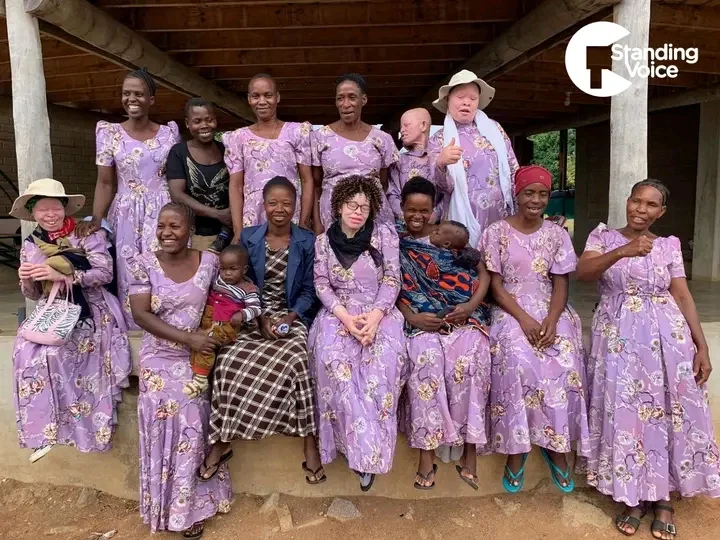
The project participants represent diverse cultural backgrounds, fostering the spirit of ubuntu, a South African philosophy that emphasizes interconnectedness and humanity. Their music addresses critical social issues, mobilizing youth towards positive change and promoting social cohesion.
The Musicians with Disability and Albinism Project successfully created jobs for 40 participants, both disabled and living with albinism. Furthermore, by utilizing local businesses for services like transportation and catering, the project generated indirect economic benefits for the community.
Standing Voice and The Musicians with Disability and Albinism Project offer a compelling vision for the future of albinism in Africa. Through healthcare, education, economic empowerment, and artistic expression, these initiatives are breaking down barriers and promoting inclusion. Their work paves the way for a future where people with albinism are not just accepted, but celebrated for their unique qualities and contributions to society.
By: Yahuza Bawage
If you enjoyed reading this article, be sure to check out this other fascinating piece!
For the latest updates, Download P+us app available on Google App Store

